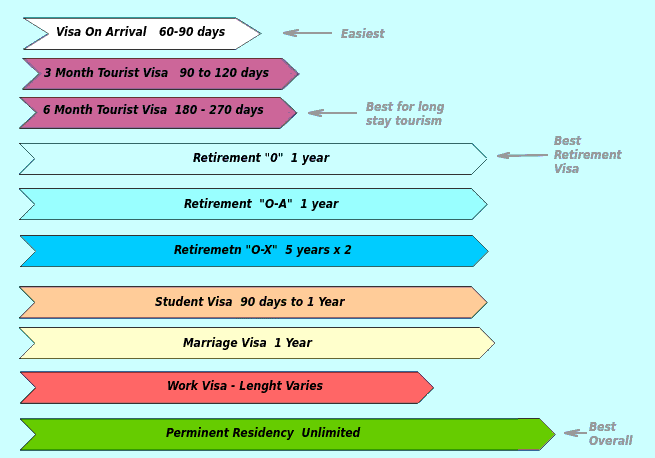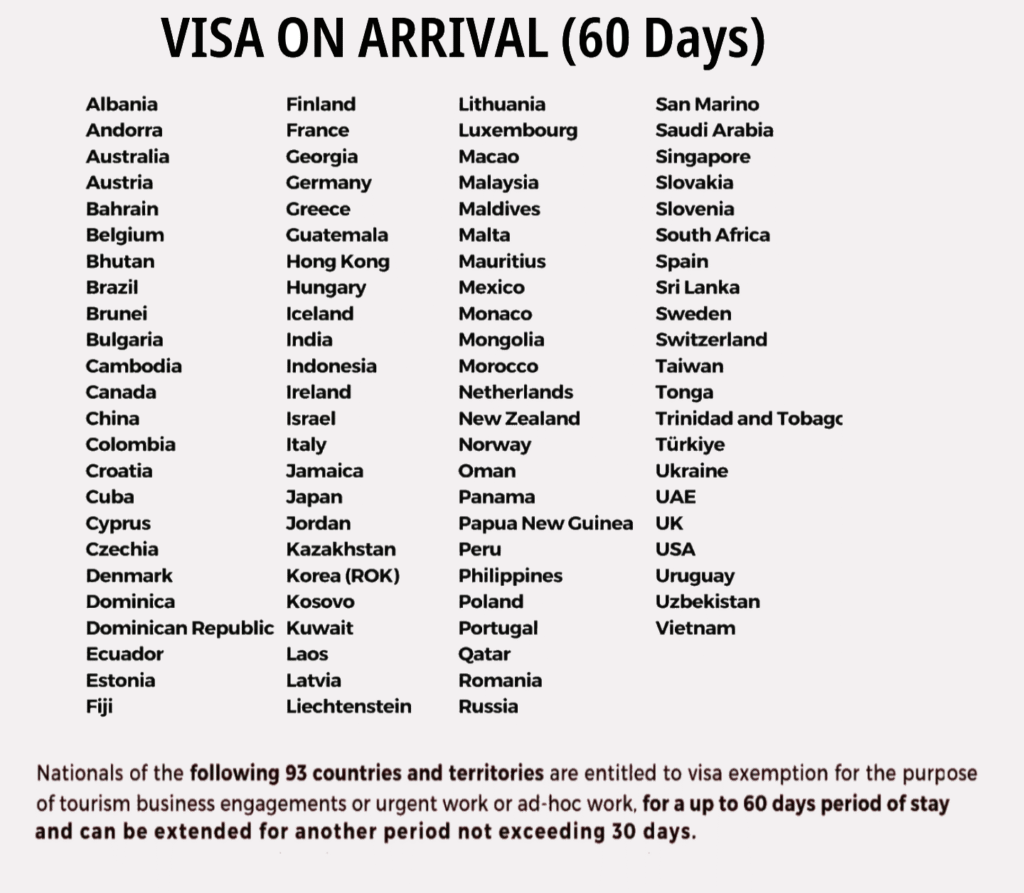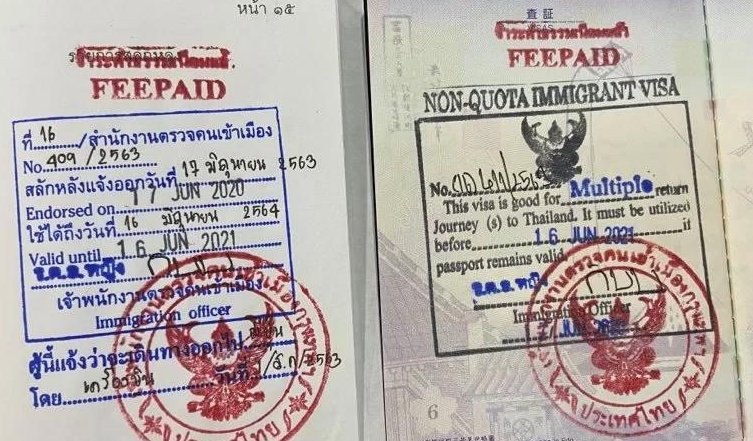Top 10 best Thai Visas
Last updated on October 16th, 2025 at 02:08 am
(There are dozens of Thai visa types, however, the list below covers the best visas which are used for 99% of foreigners)

Top 10 best Visas Explained
What is the Thailand E-Visa System?
The Thailand E-Visa system offers foreign nationals abroad a streamlined experience when applying for select visas before arriving in Thailand. The application process is done online and completely removes the need to visit the nearest Royal Thai Embassy or Consulate to apply for a Thai visa.
However, if you are eligible, entering Thailand might be even easier through the Visa on Arrival or Visa Exemption Scheme. The Visa Exemption Scheme allows citizens from specific countries to enter without a visa for up to 60 days, with the option to extend for another 30 days. Alternatively, the Visa on Arrival grants a 15-day stay to eligible travelers from a different list of eligible countries. This visa is issued upon arrival at major Thai airports and select border checkpoints, making it a quick and convenient option for short visits.
Best Thai Visas for Tourists Explained
Here are the top 3 types of tourism Visas,
The first is the 60 Day “Visa on arrival” which is the most common and easiest to get. It is an automatic VISA from most countries and needs no preapproved visa prior to traveling to Thailand. It can be extended for an additional 30 days, for about, with a trip to the local immigration office, the cost is about 58 USD.
The next 2 Tourism Visas and frequently misunderstood. The short answer is there are 3-month and 6-month Visas. Each with unique requirements, I will provide some details below….
- Visa On Arrival is an automatic Visa which is granted on arrival to Citizens from countries who have concluded visa exemption agreement with the government of Thailand may be granted with the visa exemption stamp of 30 days at the airport or 15 days if entering via any
Requirements;
Valid passport, which will not expire during your stay.
Have a residency address in Thailand to share with immigration.
Please check the list below to confirm what your citizenship will allow.

3-Month Visa is granted at a Thai Embassy outside of Thailand for a stay of 90 days. This Visa can be extended for an addition 30 days on request. (Allowed you to stay in Thailand for 120 days)
Visa requirements:
- 40 USD fee
- This is a single entry Visa
- Have a residency address in Thailand to share with immigration.
- This Visa can be extended for an addition 30 days on request.
- This Visa is no longer of great benefit since the “visa on arrival” was extended from 30 days to 60 days.
6 Month Visa is granted at a Thai Embassy outside of Thailand for a stay of 6 months. (allows you to stay in Thailand up to 9 months with 2 visa runs)
Visa requirements:
- 200 USD fee
- This is a Multi-entry Visa
- Have a residency address in Thailand to share with immigration.
- This Visa can be extended for an addition 30 days on request.
NOTE: If you intend to apply for a retirement VISA when you arrive in Thailand. This is the ideal Visa to have. It allows you enough time to meet all the retirement visa requirements before the visa expires. Within having to leave the country.
Student Visa these Visa require enrollment in an authorized school. The visa duration is for as long as the student is enrolled.
Visa requirements:
In order to qualify for a Thai Student Visa, you have to:
- Be enrolled in a Thai educational institution
- Take at least three courses (sometimes the requirement is four courses, so you have to check with your school)
- Have at least 15 hours of classes per week
- Note: The exact requirements for a Thai Student Visa are subject to change, so make sure to check in with your school before you apply.
$$ in Thai bank
$ for tuition of school.
This Visa can be extended for an addition 30 days on request.
Marriage Visa requires a valid Thai Marriage license to a Thai citizen. There are Pros and Cons of having this type of visa compared to a Retirement Visa.
Visa Requirements:
Less financial requirements than a retirement Visa, but many Expats suggest this Visa is more challenging to apply and keep this visa than a retirement visa via the immigration office.
To apply for a marriage visa, make sure you have:
- Proof of marriage such as a Thai Marriage Certificate (Kor Ror 3) and Marriage Registration (Kor Ror 2).
- Financial stability: either 400,000 THB in a Thai bank account for at least two months before applying or a monthly income of 40,000 THB. The bank must confirm that funds were transferred from abroad.
- A valid passport.
- Recent passport-sized photographs.
Work Visa usually require a sponsor “pre-hired” before applying. It is the hiring company that applies for this VISA. Additionally, there are VIP visas that grant work visa privileges.
Visa Requirements:
Work Visa requirements are extensive and can have many variables such as which country you are from, what work you wish to do, and require you have a Thai company willing to hire you as your sponsor. The details of a work visa are beyond the scope of this content.
“VIP” or “O-X” Visas – which cover several exclusive Visa types mentioned below;
Executive Visas, are a special class of Visas for the wealthy. There are 5 and 10 year Visa in the class. There are a few difference names these Visas are called such as; Executive, Elite, Privilege, Digital Nomad, DTV and LTR.
General Requirements: Large financial obligations.
These Visas seem to be tailored for the high-end executives, those that travel internationally often and those doing a 10s of millions of dollars in business per year.
LTR or Long Term Resident Visa – The LTR Visa was launched in 2022 and is intended, “wealthy” foreigners
digital nomads, retirees and highly-skilled professions. For those who have a desire to reside in Thailand, this Visa provides a long-term option with an initial 10-year stay that may be extended for an additional 10-year period.
Requirements for the LTS Vsa:
- Must present a health insurance policy in Thailand with coverage for medical expenses of no less than 50,000 USD. The remaining coverage period shall not be less than 10 months on the date of the application.
- OR provide evidence of savings of at least 100,000 USD held in a Thai or overseas bank account for no less than 12 months before the date of application.
- Must provide proof of personal income of at least 80,000 USD annually during the period of 2 years prior to the application date.
- Must have at least 1 million USD in assets.
- Must have an investment of at least 500,000 USD in Thai government bonds, foreign direct investment, or Thai property.
- Provide proof of passive* income of at least 80,000 USD annually at the time of application
- If your passive annual income is less than 80,000 USD but greater than 40,000 USD, you can still qualify provided you can prove that you have invested at least 250,000 USD in Thai government bonds, foreign direct investment, or Thai property.
- Additional requirements may apply.
Note: The LTR Visa has a requirement to go to the immigration office annual, so it’s not clear to me what the value of this Visa is over a 1-year Visa, which also has a requirement to go to immigration once a year.
DTV or destination Thailand Visa – Started in 2024, The DTV allows holders to stay in Thailand for up to 180 days per entry and is valid for 5 years. Known informally as the “digital nomad visa,” the DTV is a cost-effective and convenient Thai visa option if you are a freelancer, digital nomad, or remote worker seeking a simple way to work from the tropical paradise of Thailand.
As we’ve covered earlier, the DTV is a Visa designed for digital nomads that offers a long-term and flexible stay in Thailand with the freedom to engage in other pursuits while working in the country. To learn more about what the DTV offers, we’ve provided you with an overview below:
- Visa Duration: 5-years
- Visa Type: Multiple Entry
- Length of Stay per Entry: 180 Days
- Extendable: Yes, once per stay
- Obtainable From: A Royal Thai Embassy/Consulate or online through Thailand’s official e-visa website (cannot apply while in Thailand)
- Minimum Age for Primary Visa Holder: 20 years old
- Option to Include Family: Yes
It is important to note that the DTV is a special kind of tourist visa in Thailand, which means that holders are prohibited from obtaining a Thai work permit and working for companies in Thailand or performing freelance work for Thai clients.
NOTE: You can not apply for DTV visa while in Thailand. You must apply at a Thai embassy elsewhere or via E-visa online.
Permanent Residency Visa

Permanent Residency (PR) – Technically, this is not a Visa, This is more of a hybrid between a dual citizenship and a “Permanent” Visa, granting the holder the right to stay in the country permanently.
Permanent Residency is the ultimate objective for many Expats who want to live in Thailand permanently. It is also a one of the last steps to becoming a Thai Citizenship. However, the PR process is a laborious procedure which needs tome, dedication and over several years.
A Thai Permanent Residency Visa provides long-term stability for foreigners seeking to reside in Thailand without the need for visa renewal of passports. It facilitates legal residency, business operations, and personal investments. The process, while stringent, offers significant benefits.
Eligibility Requirements
Applicants must meet specific criteria depending on their situation:
Employment-Based Residency:
- Hold a valid work permit for at least three consecutive years.
Earn a monthly income of 80,000 THB or more for the past two years.
File tax returns showing consistent income.
Investment-Based Residency:
- Invest at least 10 million THB in Thai government bonds, real estate, or approved financial instruments.
Family-Based Residency:
- Be married to a Thai national for at least five years, or have a Thai child.
Experts and Contributors:
- Demonstrate exceptional skills or contributions in science, arts, or culture.
Documentation Requirements
The application process requires the following documents:
- Valid passport with a long-term visa.
- Proof of continuous residence in Thailand for at least three years.
- Financial records, including tax returns.
- Medical certificate from a certified Thai hospital.
- Police clearance certificate from Thailand and the applicant’s home country.
- Evidence of family ties or business investment, if applicable.
Application Process
Submission to Immigration Bureau:
- Applications are typically open from October to December each year. All documents must be submitted in person at the Immigration Bureau. There is commonly an “initial” Thai language test when submitting your application.
Interview and Language Test:
Applicants may be required to pass a Thai language proficiency test and attend an interview to confirm eligibility.
Approval Process:
The application is reviewed by the Ministry of Interior, a process that can take up to one year.
Issuance of Residency Certificate:
Upon approval, applicants receive a residence certificate, enabling them to obtain a Thai alien registration book.
Benefits of Permanent Residency
- No Visa Renewal requirements
- Permanent residents are exempt from annual visa extensions.
- Business and Property Ownership:
Simplifies company registration and allows direct ownership of condominiums.
Family Sponsorship:
- Easier to secure visas for foreign family members.
Path to Citizenship:
- PR status is a prerequisite for applying for Thai citizenship.
Responsibilities of Permanent Residents
- Annual Address Reporting:
PR holders must report their address annually to the Immigration Bureau. - Re-Entry Permits:
Apply for a re-entry permit before leaving Thailand to retain PR status.
Conclusion
Obtaining a Thai Permanent Residency Visa is a significant commitment but offers numerous benefits for those seeking long-term stability in Thailand. Meticulous preparation and professional assistance ensure a smooth application process and pave the way for a fulfilling life in the country.
Other Advantages:
- 7,600 baht for personal Application Fee
- For the Spouse Application, it costs 95,700 THB
- PR VISA will only expire if you exit the country and do not return before the annual renewal date.
- No need to apply for stay extensions
No annual visa renewals
Eligible to have your name on a house registration document
Simplified process for obtaining a Thai work permit
Ability to purchase a condominium in Thailand without transferring funds from abroad
This website does an excellent job of providing additional details. CLICK HERE
The (3) Retirement Visas Explained
Which is the best Thai visa for your retirement situation
The three types of Thai Retirement visas are frequently misunderstood, as all three have different requirements and benefits, to see the Pros and Cons of each, I have dedicated an entire webpage in the link below to clarify these.

